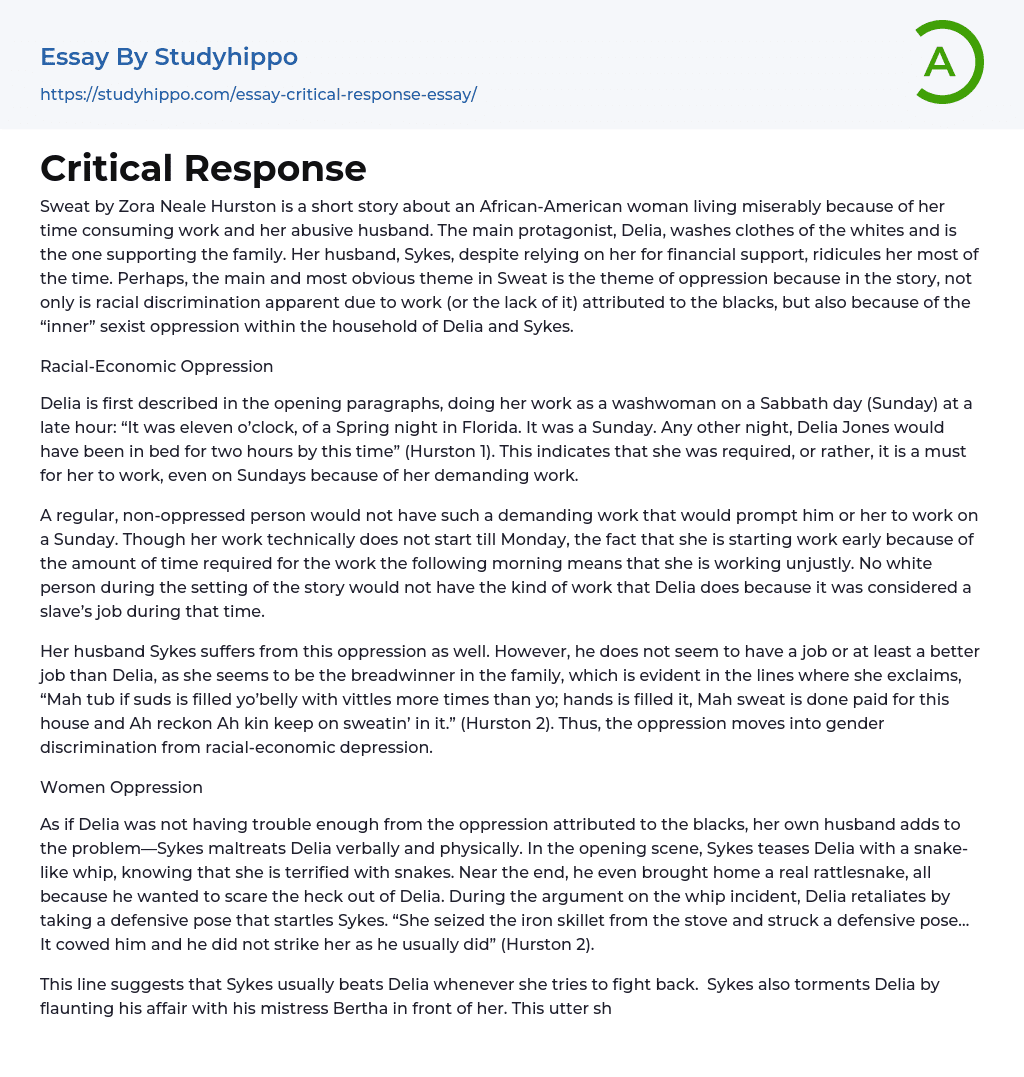The main focus of Zora Neale Hurston's short story Sweat is the difficult life of Delia, an African-American woman who suffers due to her demanding job and abusive husband. Delia supports her family by doing laundry for white people, while Sykes relies on her financially but constantly undermines her. The story primarily explores the theme of oppression, with racial discrimination evident in the limited employment options for black people. Additionally, gender-based oppression exists within Delia and Sykes' marriage.
Racial-Economic Oppression
According to Hurston (1), the initial paragraphs depict Delia as a washwoman in Florida who is working late on a Sunday night. The text highlights that her job is demanding, as she usually goes to bed at this time but is required to
...work even on Sundays.
A regular person without oppressive circumstances would not typically have such demanding work on a Sunday. Delia's work technically begins on Monday, but starting early due to the time-consuming tasks the following morning implies that she is working unjustly. In the era of the story, no white person would have a job like Delia's as it was associated with slave labor.
Both Delia and her husband Sykes experience this oppression. However, it appears that Delia has a job or a better job than Sykes, as she seems to be the primary financial provider in the family. This is evident when she says, "My tub of suds has fed you more times than your hands have, I have worked hard to pay for this house and I believe I can continue to work hard in it" (Hurston 2). Therefore, the oppression transition
from racial-economic depression to gender discrimination.
Women Oppression
Despite the already existing troubles Dee faces from the oppression attributed to African Americans, her own husband Sykes exacerbates the situation by verbally and physically abusing her. In the beginning, Sykes torments Dee with a whip resembling a snake, fully aware of her fear for them. Towards the end, he even brings home an actual rattlesnake with the sole intention of deeply frightening her. During an argument about the incident with the whip, Dee defends herself by adopting a defensive stance that surprises Sykes. "She grabs the iron skillet from the stove and assumes a defensive position... It intimidates him, leading him to refrain from physically assaulting her as he usually does" (Hurston 2).
In this paragraph, it is suggested that Sykes consistently beats Delia whenever she tries to fight back. He also torments Delia by openly flaunting his affair with his mistress Bertha, showing a complete lack of respect for Delia's feelings. This disrespectful behavior demonstrates Sykes' oppressive attitude towards women, treating them as objects rather than considering their emotions (Barnes). One of the townsmen, Clarke, compares Sykes' view of women to how sugar canes are treated: "When they are satisfied that they have extracted all they can, they discard them just like a chewed piece of cane" (Hurston 4).
Conclusion
In Sweat, Zora Neale Hurston explores multiple themes, with oppression being the most prominent. Hurston's work reveals that oppression exists not only between different races, but also within black communities, specifically through the subjugation of women.
- Boo Radley essays
- Genesis essays
- Richard iii essays
- Alice in Wonderland essays
- On the road essays
- Ozymandias essays
- The Nightingale essays
- Holden Caulfield essays
- Animal Farm essays
- 1984 essays
- A Hanging essays
- Shooting An Elephant essays
- A Tale Of Two Cities essays
- Adventures Of Huckleberry Finn essays
- Arthur Conan Doyle essays
- Brave New World essays
- Characters In Hamlet essays
- Characters In Romeo And Juliet essays
- Desdemona essays
- Diary Of A Wimpy Kid essays
- First-Person Narrative essays
- Frankenstein essays
- Heart Of Darkness essays
- Jane Eyre essays
- Jay Gatsby essays
- King Duncan essays
- Librarian essays
- Little Red Riding Hood essays
- Lord Of The Flies essays
- Silas Marner essays
- The Cask Of Amontillado essays
- The Catcher In The Rye essays
- The Crucible essays
- The Handmaid's Tale essays
- The Reader essays
- Virgil essays
- Wuthering Heights essays
- Candide essays
- Castle essays
- J. D. Salinger essays
- Ulysses essays
- Ethan Frome essays
- In Cold Blood essays
- Outliers essays
- Tuesdays With Morrie essays
- The Art of War essays
- Wife of Bath essays
- Huckleberry Finn essays
- The Lady With The Dog essays
- Great Expectations essays




